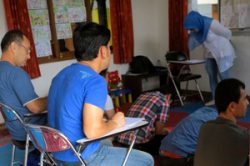Indonesia – Choosing To Be Empowered
11 June 2015|Triarani Utami

Thursday, June 11th, 2015 – Women and children are most vulnerable in regards to various issues arising during conflict and displacement. Often, they are suffering when having to deal with the social, political, educational, cultural and economic impact of war or forced displacement.
This is what happened to Laila, her mother and her sister. Violent conflict in their home country Pakistan resulted in a life full of fear. Laila, a 27-year-old woman was not able to continue her work and education at the university due to the worsening security situation. The traumatic situation of Laila and her 10-year-old sister at the time was further worsened when witnessing their mother being exposed to domestic violence.
Until one day, when the building next to their house was destroyed by a bomb blast, Laila made the decision to leave with her mother and sister.
“The three of us arrived in Jakarta in 2012. We applied for asylum at UNHCR to get protection as refugees. At that time, we did not know how long it would take to get a safer life in a third country willing to accept us.”
In fact, Laila and her family had to wait a year to get refugee status, and until today, more than two years later, they are still awaiting to be accepted by a third country for resettlement.
The long wait is not without problems. When the supplies and savings they had brought from Pakistan run out, Laila and her family found it increasingly difficult to meet the basic needs of everyday life. There were times when they could just sit hungry in their room in West Java with no money or groceries left. Limited access to social and economic activities made the waiting for Laila and her family unbearable and stressful.
In mid-2014, Laila heard about JRS Learning Centre from a fellow asylum seeker. “My friend knows that I can speak English fluently. He advised me to go to JRS Learning Centre and become a volunteer teacher for English classes for other asylum seekers.”
Soon after Laila contacted JRS staff, she began teaching at the Learning Centre. When asked why she wanted to become a volunteer teacher, Laila replied, “In JRS Learning Centre, I am able to meet many people. Otherwise, I would just stay home with nothing to do, except to think and become more and more stressed. With teaching, I feel that I can be a person with a meaning in life.”
Until now, Laila is the only woman from the volunteer teachers at the Learning Centre. Meeting with many people who value education opened doors for Laila, who started teaching children and other adult asylum seekers, who wanted private English lessons. Currently assisted by her daughter, Laila’s mother also started to volunteer in the Learning Centre, teaching other women in handicraft.
Understandably, Laila still feels sad sometimes when reflecting on her situation and what had happened to her so far. “It has been two years now that I lived in Indonesia, and still no news about our resettlement process. I am sad to think that I have lost two years of my life in uncertainty. However, sometimes I also think, wow… I am strong enough to survive that long. Had I known if I had to wait for over two years back then, I would have given up immediately. But it turns out I can get through it.”
Laila’s mother and sister are one source of strength for her to continue to survive and become the backbone of the family. “Sometimes I can teach 5 classes a day continuously even when I have not eaten. I do this especially for my sister.
Maybe there will be no chance for me to realize my dreams. But my sister, she will be able to live my dream when we’ve got a better life later. You know, at this time my only option is to live here. I must try to find the good things that I can be thankful for, because if not, what else do I have?”
Courage and resilience often grow in unexpected ways and places. For Laila and her family, acceptance and hope become the fuel that helps them to move on through hardship and uncertainty, and allowing them choose to be empowered.
* Name has been changed to protect identity.


